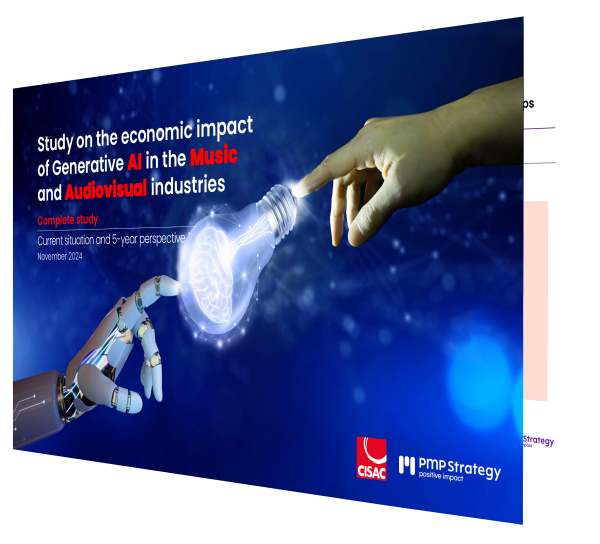PMP Strategy/CISAC study on the economic impact of AI in music and audiovisual industries
Global study shows copyrighted works are driving value for AI providers while leaving creators out of the growth. First study to estimate the economic impact of Gen AI on creators of music and film on a global level.
DOWNLOAD THE EXECUTIVE SUMMARY


CISAC commissioned this study from PMP Strategy to show the enormous value that copyright works bring to Gen AI companies. Its conclusions point to a fundamental flaw that is opening up in the market, with creators’ works being unfairly and unethically appropriated to boost the revenues of Gen AI providers, while leaving the creators themselves out of this growth. There is a critical message here for policy makers: they must act urgently to safeguard human creators, culture and creativity.

For creators of all kinds, from songwriters to film directors, screenwriters to film composers, AI has the power to unlock new and exciting opportunities – but we have to accept that, if badly regulated, generative AI also has the power to cause great damage to human creators, to their careers and livelihoods. Which of these two scenarios will be the outcome? This will be determined in large part by the choices made policy makers, in legislative reviews that are going on across the world right now.

AI tools can profoundly support our work as story tellers and film makers. But there is an enormous anxiety that in the rush to exploit and monetise generative AI, creators will be treated like an afterthought, lacking the right to authorise uses of their work, unprotected by transparency rules and unable to receive fair remuneration. We must not forget that it is human creators who provide the fuel of the AI world and who must be at the centre of policy making and regulation.

Our sector has adapted to whatever new technology comes our way, but with generative AI we find ourselves in uncharted territory as the disruption goes to the very core of the creative process, not just its distribution channels. We stand ready to embrace these changes, but let there be no doubt: our foremost priority is to protect the livelihoods of our member creators.
Key findings of the study: Music
Gen AI outputs in Music will be worth a cumulative €40Bn over the next five years, rising to an annual value of €16Bn in 2028. By 2028, Gen AI music will account for around 20% of music streaming platforms’ revenues and around 60% of music libraries revenues
Under current conditions, this market penetration by Gen AI outputs could put 24% of Music creators’ revenues at risk in 2028. This represents a cumulative loss of €10Bn over the next 5 years, and an annual loss of €4Bn in 2028.
Gen AI services in Music (both mass public and professional tools/softwares) are projected to generate exponential revenue growth, reaching an estimated €4Bn in 2028, with a cumulative total of €8Bn over 5 years.
Market size
€16Bn
Estimated market value of Gen AI outputs in Music in 2028
Revenue loss
€4Bn┃24%
Creators' revenues at risk in 2028 compared to a no Gen AI situation
Gen AI services' revenues
€4Bn
Estimated revenues of Gen AI Music services in 2028
Key findings of the study: Audiovisual
AI-generated complete Audiovisual outputs are expected to be worth c. €48Bn in 2028. Audiovisual outputs generation for social media and TV will account for the lion’s share of the market.
The widespread use of Gen AI tools throughout the production process of audiovisual works could put 21% of creators' revenue at risk by 2028. This represents a cumulative loss of €12Bn over the next 5 years, and an annual loss of €4.5Bn in 2028.
Gen AI services in Audiovisual (both mass public and professional tools/software) are projected to generate exponential revenue growth, reaching an estimated €5Bn in 2028, with a cumulative total of €13Bn over 5 years.
Market size
€48Bn
Estimated market value of Gen AI outputs in Audiovisual in 2028
Revenue loss
€4.5Bn┃21%
Audiovisual creators' revenues at risk in 2028 compared to a no Gen AI situation
Gen AI services' revenues
€5Bn
Estimated revenues of Gen AI Audiovisual services in 2028

Key takeaway
In an unchanged regulatory framework, creators will actually suffer losses on two fronts: the loss of revenues due to the unauthorised use of their works by Gen AI models without remuneration; and replacement of their traditional revenue streams due to the substitution effect of AI-generated outputs, competing against human-made works.
Key priorities action for policy makers
Gen AI providers are building significant revenues by leveraging copyrighted content to develop and train their models and generate AI content. AI services are benefiting from parasitic growth of their revenues, fuelled by the use of copyrighted content without the consent and remuneration of those who create it. This is leading to a new “transfer of value”, with creators’ revenues being unfairly and unethically appropriated by Gen AI providers.
Amid the current uncertainty around Gen AI practices, CISAC calls on policymakers to develop, where required, a well-defined legal and regulatory framework that ensures ethical behaviour by AI operators, including respect of copyright and proper remuneration of creators. This framework should be accompanied by enforceable transparency obligations such as those provided under the EU AI Act, as creators and CMOs need information on how their works are used to effectively enforce their rights.
Rightsholders and CMOs have a proven history of adapting to innovative technologies. They are actively developing diverse, effective solutions that enable AI services to get access to large repertoires of works for training in a flexible and tailored way. AI services should rely on these solutions to get the insurance that they are not infringing on copyright when training their models.
This should aim to be a win-win for creators and tech companies. However, the reality is more complex, as not all creators benefit equally. The opportunities presented by GenAI services can be better realised in an environment where creators are fairly compensated for the use of their works by AI services. Without urgent commitment from all stakeholders to address this imbalance, the current situation significantly risks undermining cultural diversity and diminishing the quality of creative content available on the market.